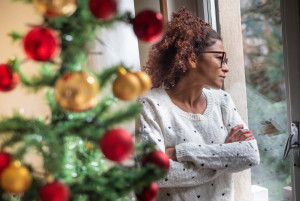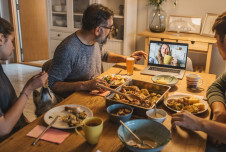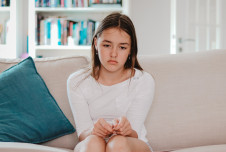When I (Rebecca) was 10 years old, my grandparents visited me at sleepaway camp. They brought a picnic lunch, and as we sat on the grass enjoying the carefully curated selection of my favorite foods, I made a confession. “I just can’t stop feeling homesick,” I admitted, my eyes welling with tears.

My grandfather put his hand over mine. “Homesickness is a hard feeling,” he said thoughtfully. “But it’s also a good one. It means you have a home that’s really worth missing.”
As we experience a holiday season different from any we’ve undergone before, this childhood interaction has taken on new relevance. In California, a new shelter-in-place order will last at least until January 4, 2021, which means that for many people, Christmas and New Year’s plans are canceled. With over 282,000 American deaths (and millions ill) from COVID-19, the potential for a turbulent transition of power in January, and a country fiercely divided over too many issues to count, unpleasant feelings abound. And though we may not have control over these circumstances, we can get wise in how we handle our feelings about them.
Psychological science reveals that even a small shift in how we orient ourselves in relation to feelings—how we think about them, what we focus our attention on, and what internal experiences we make space for—can have a large impact on how we experience the holidays this year.
You feel how you feel
First, though, it bears emphasizing that reorienting around our difficult emotions does not mean ridding ourselves of them.
No matter how hard we may try (more eggnog, anyone?), a foundational truth is that we cannot force our feelings. And yet the impact of a lifetime of exposure to holiday messaging—religious, familial, commercial, and everything in between—doesn’t just disappear from one December to the next. Isn’t this the time of year when we’re supposed to count our blessings, and appreciate all we do have, no matter what we don’t? If we ourselves have been lucky enough to escape the most direct effects of the virus, the flailing economy, or the increase in violent crime and mental health problems, then aren’t we extra horrible for not reflecting on all that’s merry and bright?
Put simply: No.
As the reindeer Sven once noted, “You feel how you feel, and your feelings are real.” Social science backs Sven’s sung wisdom. The more we attempt to push down authentic feelings in the hopes of replacing them with ones we like better, the peskier and more persistent they remain. Consider Carl Jung’s famous description of emotions: “What you resist not only persists, but will grow in size.” This paradoxical effect of emotions is more common than most of us realize, and has been demonstrated clearly in laboratory and daily diary studies.
When we struggle against experiences we find uncomfortable, our discomfort intensifies. But simply being with our difficult feelings is easier said than done, particularly when they run counter to what we believe this time of year “should” be about. Let science guide us toward a third option.
Learning acceptance
For starters, we can turn to strategies from acceptance and commitment therapy (ACT), a scientifically validated approach that helps individuals learn to make space for emotional discomfort while simultaneously reconnecting to value-aligned action.
Core to ACT is the concept of radical acceptance, described by psychologist Tara Brach as having two interdependent wings: seeing our experience clearly, and holding our experience with compassion. This kind of acceptance begins with a clear and accurate understanding of our reality. After all, it’s hard to know where to go if we can’t see where we are.
We asked Dr. Jill Stoddard, ACT expert and author of Be Mighty and The Big Book of ACT Metaphors, why it’s important to accept rather than fight our 2020 holiday reactions. “If your rotten experience can be changed for the better without sacrificing what is important to you, by all means fight to change it,” she says. “But often the very things we do to fight uncomfortable thoughts and feelings pull us away from our most deeply held personal values.”
She adds: “If the only way you can feel better about not being able to travel for Christmas or Hanukkah is to eat a whole pie and drink three bottles of wine, it’s going to be difficult to connect in a meaningful way with your children as they unwrap their gifts.”
If accepting rotten experiences doesn’t sound appealing, you aren’t alone. Take heart; this is where compassion comes into play.
Have some compassion for yourself
Self-compassion is defined by researchers as treating ourselves with kindness, tapping into a sense of common humanity, and making space for emotions, thoughts, and experiences (including our most uncomfortable ones). It may seem like a meager response to great injustices, but self-compassion has been explored extensively and revealed to be powerful in inducing optimism, resilience, and internal stability in the face of challenges. Self-compassion doesn’t undo pain; it helps us to transcend it more skillfully.
And sometimes acceptance acts as a pathway toward change. Accepting our circumstances, angry or grief-stricken feelings, and unhappy thoughts can shed light on our values and priorities. Clarifying what matters most deeply to us can then lead to curiosity about what is within our control.
Studies suggest that it’s helpful to look for the silver lining when a stressful situation is outside of our control, and to look for ways to make value-consistent behavioral changes in areas where we do have some control. This general advice calls to mind Reinhold Niebuhr’s famous Serenity Prayer, in which we ask for serenity in accepting the things we cannot change, courage in changing the things we can, and, perhaps most importantly, the wisdom to know the difference.
Though we can’t change the reality of this pandemic or the general social turmoil all around us, we can make changes in how we frame stories about what is happening, as well as the day-to-day choices we make.
In the case of families who cannot be together, this may take the form of accepting the sadness of a holiday apart from loved ones. Offer yourself kindness and remember that you are in good company in your grief. From there, you can strive to savor small and unanticipated gifts, like feeling relief at avoiding the annual political debate with crabby Uncle Irv and appreciating your luck to have a family and traditions to miss, even as you make space for sadness.
Both of us are psychologists, well-schooled in the ways of acceptance and silver-lining finding. Yet we both anticipate feeling homesick over the holidays, not to mention sad, angry, disappointed, and just plain worn out with how 2020 has treated humankind.
But psychological practices of acceptance, self-compassion, and value-based action help illuminate that the kinds of holiday seasons we’ve experienced in the past—and the ones we’ll no doubt have again in the future—are worth missing in the present. And that helps.









Comments